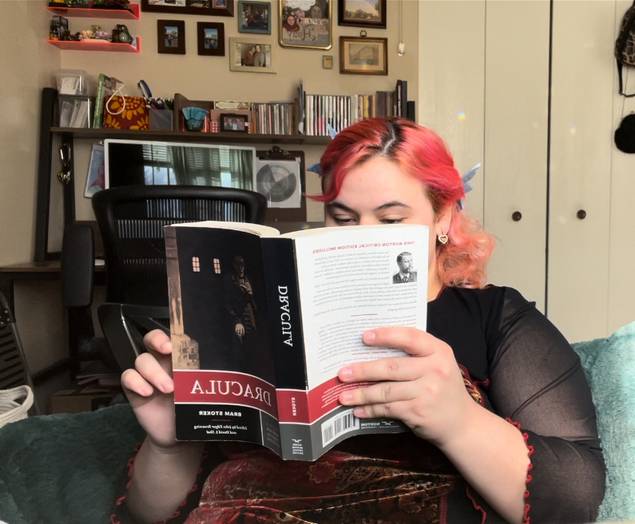Blog
Permanent link for Reading for Wellness on February 15, 2024
As students, we are expected to read and read often. Many of us are drowning in textbook chapters, novels, articles, and wordy Blackboard discussion posts. While this reading is of course crucial to our educational endeavor, it can lead to huge reading burnout. Over winter break, I picked up a young adult romance novel and realized just how much I missed reading for enjoyment. It got me thinking about how I’ve learned to approach reading as a college student– I don’t unless I have to and when I do, I am skimming– part because I don’t have time to read, but part because I’m uninterested. A lot of people who came to college as bookworms have lost that part of themselves underneath all of the content– but it’s so important to win that part back. Others, maybe were never into reading– that’s okay too. But there’s so much more to reading once you get beyond the annoyance. Reading is like sex– especially if you’re reading erotica– everyone has yucks and yums and all are valid. There is a lot of reading material out there for everyone’s interest in well-being. We’ll dive more into this later.
Reading for relationship-building
There are a lot of published studies that highlight the importance of reading for mental wellness and intellectual wellness. Many of us have heard of reading to reduce stress and anxiety in addition to improving cognitive outcomes (check out this article that explores some of this!) However, one perk of reading that does not get emphasized enough is the benefit of reading for our social life; cracking open a book can improve social wellness! Reading perspectives that are similar and dissimilar to ours helps us improve our ability to communicate with others as well as build a foundation for solid values and understanding one another. One study concluded that reading “includes learning more about yourself and others; learning how to understand, empathize, and interact with other people; gaining insight into your and others’ relationships; and generally helping with personal problems” (https://journals.ala.org/index.php/rusq/article/view/4099/4667).
An additional option for exploration is book clubs! One study found that “A sense of belonging was achieved between students with a variety of differences and
disagreements. The sense of belonging extended to multiple contexts, deepening understanding and accountability within the academic and social aspects of learning” (Petrich 11).
Book clubs serve as an opportunity for social interaction while also creating a shared interest for discussion to break the ice. If you’re interested in joining a book club, there is a student organization Book Club. Find out more information on laker link. A lot of bookstores and coffee shops also host book clubs- keep your eyes peeled for fliers when you’re there!
Let’s Talk About Sex (In Literature)
So, speaking of erotica, let’s talk about sex. We live in a culture, and a geographical space, where sex is taboo. As a peer sex educator, I feel perfectly comfortable talking about sex and sex education- but I also acknowledge that there is stigma. Not everyone is having sex and not everyone wants to and that is so valid! For those wanting to explore sex and sexuality while remaining abstinent, one of the best places to go is literature. Of course, there are educational texts out there that include diagrams of penises and vulvas which are great to learn about anatomy, but there is so much more available than what we might’ve been taught in sex ed. There’s a huge variety of content that covers sex and sexuality such as romance novels, erotica, online fanfiction*, books that explore the psychology of sex and relationships, books about sexuality, and the iconic category that is “ah! Horny Vampires!” (looking at you Twilight and Dracula). Reading about sex and sexuality as an alternative to engaging in sex is great for protecting against STIs and pregnancy. When combined with sex, reading material like erotica can spice things up.
Check out some benefits of reading erotica: https://hellogiggles.com/erotica-benefits/
Self-proclaimed sexologist Lucy Rowett shares some books that led her to become a sexologist: https://lucyrowett.com/top-10-books-influenced-me-sexologist-purity-culture/
*Please be advised that fanfiction is a very broad genre and may be confusing to navigate. Often, there are fanfiction websites with special search engines that allow you to explore what you’re looking for. Search safely (and clear your browser history).
Financial Wellness
Finance literature may be an intimidating genre for many college students. However, there is a lot of information out there that does apply! While we may not care to learn about 401ks and savings bonds, doing some research on budgeting, how to use a credit card, and navigating student loans may be beneficial. One great resource if you’re looking for a shorter read is the Federal Student Aid webpage. The Federal Student Aid webpage contains a lot of information specific to students and offers different resource links for further reading and research!
Overview
There’s a lot of stuff out there to read! Instead of scrolling through Tiktok, consider looking for some reading materials- whether it be a full-length novel, an article, or a blog post (such as the WIT blog series). Read on!
By: Rowan, WIT Peer Educator
Categories:
General Wellness
Press Pause
Rest
Posted
on
Permanent link for Reading for Wellness on February 15, 2024.

